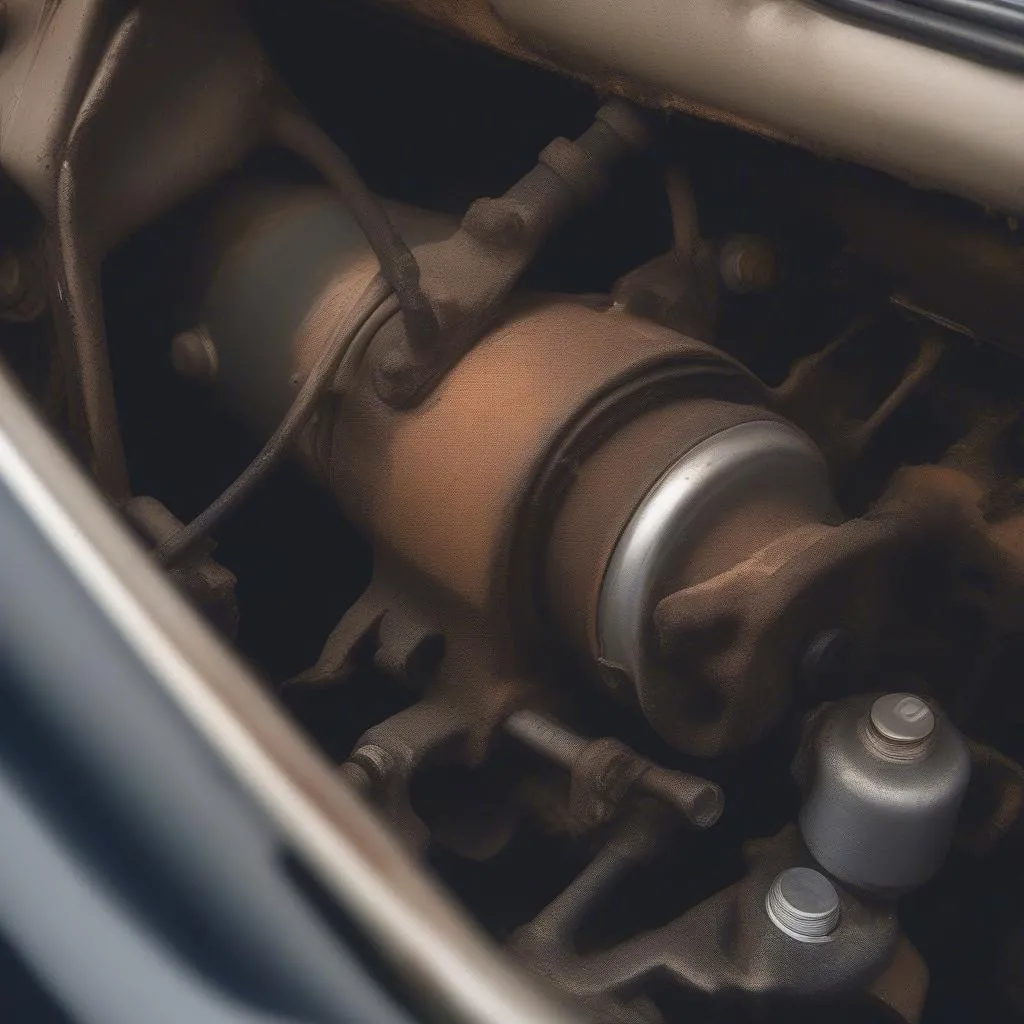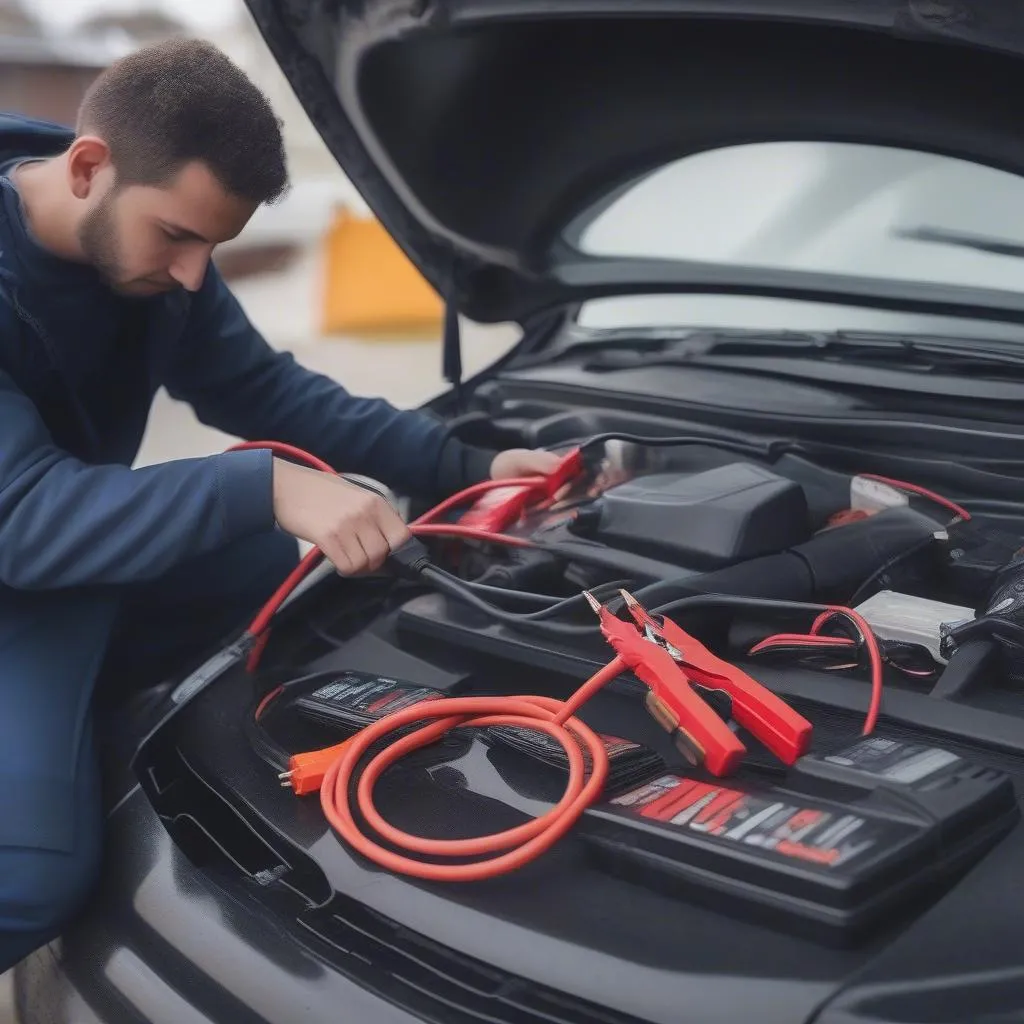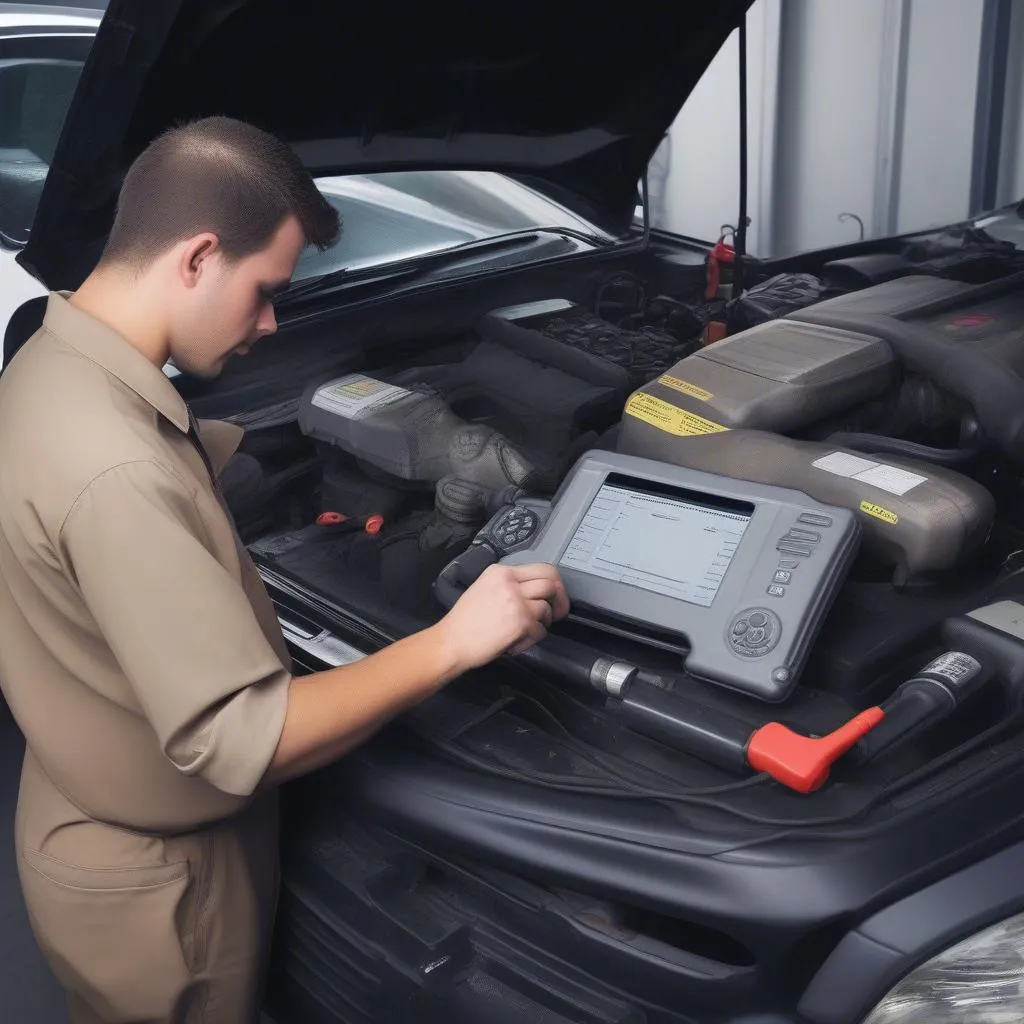Picture this: you’re running late for work, jump into your trusty 2018 Honda Accord, turn the key, and…nothing. The radio is blasting, the headlights are bright, but the engine just won’t turn over. It’s a frustrating situation that every car owner dreads – a car that won’t start but has power. Don’t panic, we’re here to help you troubleshoot this common problem.
What Does “Car Won’t Start But Has Power” Actually Mean?
From a mechanic’s perspective, “car won’t start but has power” usually means the battery is strong enough to power accessories but can’t crank the engine. This points towards a problem somewhere in the starting system, not necessarily a dead battery.
Let’s break it down:
- Electrical Power: Your car’s electrical system relies on the battery to function. When you turn the key, the battery sends a surge of power to the starter motor to crank the engine. If your lights, radio, and dashboard lights are working, it means your battery has some charge.
- Starting System: This system includes the starter motor, ignition switch, and solenoid, all working together to get your engine running. If any of these components fail, your car won’t start, even with a fully charged battery.
Why Won’t My Car Start Even Though It Has Power?
There are several reasons why your car might have power but refuse to start. Here are some of the most common culprits:
1. Faulty Starter Motor
Imagine this: You’re trying to start your Ford Focus in a bustling Chicago parking lot, but you hear a clicking sound instead of the engine turning over. This is a telltale sign of a failing starter motor.
The starter motor is responsible for turning the engine over and getting it started. Over time, the motor can wear out, the connections can corrode, or the solenoid (a small electromagnet) can fail.
 faulty-starter-motor
faulty-starter-motor
2. Bad Ignition Switch
Ever parked your Toyota Camry on a steep San Francisco hill and struggled to get it started? A faulty ignition switch can be the culprit. This switch sends power to the starter when you turn the key. If it’s worn out or damaged, it may not complete the circuit, preventing your car from starting.
3. Dead Battery (Even With Lights On)
Wait, what? Yes, even if your lights are on, your battery might still be the issue. A battery on its last legs may have enough juice to power accessories but not enough to deliver the strong current needed to crank the engine. This often happens in cold weather, as cold temperatures reduce battery output.
4. Fuel System Problems
Sometimes, the issue isn’t electrical at all. If your car isn’t getting fuel, it won’t start. This could be due to a clogged fuel filter, a malfunctioning fuel pump, or even running out of gas!
Pro Tip: Always check your fuel gauge first – you’d be surprised how many “car won’t start” problems are solved with a simple trip to the gas station!
5. Other Issues
While less common, other issues can also prevent your car from starting, such as:
- Immobilizer System Malfunction: Modern cars have anti-theft systems that prevent starting unless the correct key is present. If the system malfunctions, it might prevent your car from starting.
- Faulty Sensors: Sensors like the crankshaft position sensor send vital information to the engine control unit (ECU). A faulty sensor can disrupt this communication, preventing the engine from starting.
What Should I Do If My Car Won’t Start?
Experiencing a “car won’t start” situation can be stressful, but here’s a step-by-step guide to help you troubleshoot the problem:
- Check the Obvious: Ensure the car is in “Park” or “Neutral,” the parking brake is engaged, and you’re pressing the clutch if you have a manual transmission.
- Inspect the Battery Connections: Make sure the battery terminals are clean, tight, and free of corrosion. Loose or corroded connections can disrupt the flow of electricity.
- Try Jump Starting: If you suspect a weak battery, try jump-starting your car using jumper cables and another vehicle or a portable jump starter. Read more about car battery problems here.
- Listen for Sounds: Pay attention to any sounds when you try to start the car. Clicking noises often indicate a starter motor issue, while a whining noise might point to a faulty fuel pump.
- Check for Fuel: Ensure you have enough fuel in the tank. It seems obvious, but it’s easy to overlook!
- Consider Your Surroundings: Did the problem start after a cold night, a heavy downpour, or parking on a steep incline? Environmental factors can sometimes contribute to starting problems.
- Use a Diagnostic Scanner: If you’re comfortable with car electronics, a diagnostic scanner, like those used by professional mechanics, can help read your car’s computer for error codes that might pinpoint the problem.
- Seek Professional Help: If you’ve exhausted all other options, it’s best to call a tow truck and take your car to a trusted mechanic or dealership for diagnosis and repair.
 jump-start-battery
jump-start-battery
Remember: Attempting to fix complex car problems yourself without proper knowledge and tools can lead to further damage and costly repairs.
FAQs: Car Won’t Start But Has Power
Q: Can a bad alternator cause a car not to start even with a new battery?
A: Absolutely! While the alternator’s primary job is to recharge the battery while the engine is running, a faulty alternator can prevent a new battery from receiving a charge, eventually leading to starting problems.
Q: How long should a starter motor last?
A: Starter motors typically last for around 6-8 years or 100,000-150,000 miles, but their lifespan can vary depending on factors like driving conditions and maintenance.
Q: Is it safe to drive my car if I suspect the ignition switch is faulty?
A: A faulty ignition switch can be a safety hazard, as it might cut off power to your engine or accessories while driving. It’s best to have it inspected and repaired by a qualified mechanic as soon as possible.
Expert Insight: “Many car owners underestimate the importance of regular car maintenance,” says automotive expert David Miller, author of “The Complete Guide to Car Care.” “Regular inspections and timely replacements of wear-and-tear components like the battery, starter, and alternator can prevent unexpected breakdowns and costly repairs down the line.”
Related Questions:
- My car is making a clicking noise but won’t start. What could be wrong?
- How can I tell if it’s my starter or my battery?
- Can a bad fuel pump prevent a car from starting?
- What are the signs of a failing ignition switch?
- Learn about the signs of a bad car battery vs. alternator.
Need Help Getting Your Car Started?
We understand the frustration of a car that refuses to start. If you’re experiencing this problem and need expert advice or assistance with diagnostic tools, don’t hesitate to contact us on Whatsapp at +84767531508. Our team of automotive specialists is available 24/7 to help you get back on the road.
 car-repair-shop
car-repair-shop
Remember: Regular car maintenance is crucial for preventing unexpected breakdowns and ensuring your vehicle runs smoothly for years to come.
Let us know in the comments below if you have any other car-related questions or need further assistance. Safe travels!